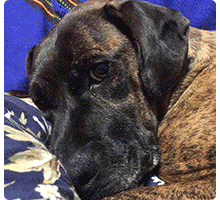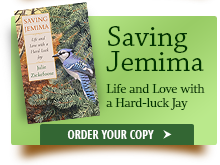force. During the day they retreat into the nest, so nobody can see them to preen them off. Eeeeyew. You can see the gray larvae in the lower third of the nest, and the yuccky wet layer of blowfly- processed bluebird blood below that. After awhile you can smell them as soon as you open the box, and you know when the nest needs to be changed.
.

I've seen a load like this contribute to the death of broods in the kind of cold, rainy weather we've been enduring, when the parents can't find enough food to offset the blood loss the young birds suffer. But you can't use pesticides around baby birds, whose tissue-thin skin and high metabolisms make them extremely vulnerable to poisons as seemingly innocuous as pyrethrins and rotenones. I won't even talk about bluebirders who swear by Sevin dust. They're out there, merrily dusting their boxes with pesticides, saying it's the only way to go. And I think that's a terrible thing to contemplate, much less to do.
In one of our organic bluebird nest checks, Phoebe volunteered to hold the babies while I fashioned a new nest for them.

Everything went pretty well until the baby bluebirds decided to find a better place to hide. They're only about 12 days old, not ready to fledge, but they're getting fledgy. This is the last day we could handle them safely without their trying to exit the box prematurely. Try this on Day 13 and you'd have babies popping around like popcorn, calling frantically and refusing to
stay in the box. Times like that, you have to stuff a sock in the box entry hole, give them a half hour to settle down, and then quietly remove the sock. But sometimes even that won't work, and the babies spill out and hop around on the ground, where their beleaguered parents do their best to feed and protect them. You don't want to mess with bluebirds after Day 12.
.

Wuh-oh. They're starting to scatter. Wait. There were five before. Phoebe began giggling helplessly as a clammy little bluebird made its scritchy way up the sleeve of her hoodie.

I retrieved it from its nice warm lair and replaced it in the new nest.

You little goofball of a baby bluebird. Pretty good thinking, though, to hide like that. Notice how Chet Baker patrols around without bothering anybody.

I know. It's not a real Chetfix. But I figure even his receding form is better than no Chet at all.
Today's hiatus is going to be happening more in June. There will be times when I can't post. I'll do my best, but don't be surprised if there are pauses. Life's running me.







19 comments:
First, eeeyewww on the blowflies!
Second, aawwww on the baby bluebirds.
I believe Baker is patroling making sure no house sparrows are lurking ready to invade the nest! Would house sparrows invade a nest now with fledglings that size? What, maybe I don't want to know.
Dear Christine,
HOSP generally do their dastardly work when the babies are pink and tiny, and still able to be dragged out of the house. They also will peck an incubating female bluebird to death, then throw the eggs out. I've been fielding some tearful calls and e-mails from people thus afflicted. I send them all to www.nabluebirdsociety.org
for their catalogue of sparrow traps, including my favorite, the Gilbertson in-box trap.
We both examined bluebird babies today. I'll look for blowflies and come back here if I need help. So far, I haven't seen HOSP in the area and for that I'm thankful.
Life is running too fast, I understand, Wonder Woman. Breathe deeply.
Enjoyed your photos - made me giggle watching Phoebe gasp and Liam smile. And you.
Isn't it interesting that there is always a Boston Terrier either up front or in the background? :o)
Ha! I'll have to show your blog to my hubby. He gets aggravated with me when I check my two nest boxes that have nests. I haven't seen anyone enter or exit them lately so I'll have to check again. I'm scared to touch them though...
I wondered how your bluebirds were faring without you. Maybe I'm lucky or maybe it's geopgraphic, but I have never had blowflies in my bluebird boxes. I don't do nest changes, but I do check regularly, clean the boxes out after each clutch fledges, and occasionally drag a nest out to photograph the young.
(Aside to Amy: It's OK to check on bluebirds, daily even, up till day 12 of the young fledglings' lives. You can touch the nest, even touch the babies, and your scent won't cause the parents to abandon the nest.)
I have nesting going on all around me; 5 eggs in the tree swallow box, second bluebird nest complete and egg-laying should commence any day (maybe today; couldn't check this AM), after 5 fledged April 30, and too many Purple Martins to count. 12 active nests, 3 with eggs as of Sunday.
I read a comment on another blog about someone counting blowflies and knew it had to be you! I had no idea about what can happen in a nest. You really are to be commended for all your hard work, and for sharing your knowledge.
Oh my... I've never seen the blowfly larvae like that. Ewwwww indeed!
Changing nest material, now that's going above and beyond the call of duty. In addition to removing blowflies, you are probably making the nests less attractive to smell-oriented predators. They would hammer my fragrant ash-throated flycatcher nests.
-Max
Just when I think I have heard (and seen) it all you arrive bearing blowfly larvas. Gruesome but fascinating at the same time. As I lifelong learner -- your blog is a treasure trove of fascinating facts. Thank you!
I have babies! I have babies!! They aren't bluebirds...I haven't seen any around my house. They are little brown birds. Please forgive me ~ I'm not good on id'ing the little brown birds.
I gathered up my courage ready to be disappointed because I have seen some house sparrows around and hadn't seen the parent birds lately. Tonight when I got home from work I was able to hear the cheeping from one of the nest boxes and one of the parent birds flew out. I went around to the other side of my shed with the other nest box and both parent birds flew out and I was able to hear softer peeping from that box. I even made my hubby go out with me and listen to the baby birds. He's 6'4 so he was able to look into one of the boxes and said he saw the babies. I'm so excited!!
Oh, I opened up the boxes and didn't see anything like you showed in your photos.
Hi Julie,
Good information about the blowfly. I keep a look out for them in my bbird boxes as well as in my purple martin house, but have never seen them bad enough in my area to change out a nest. Maybe I should(?). I do change out the nest after each fledgling. Do you change out the nest regardless of its condition (before fledglings)?
PS. I also use the Gilbertson in-box trap. I've also had good success with the Van Ert box trap for my wood boxes. (http://www.vanerttraps.com/universal.htm)
Alan
Hi, Alan, nice to hear from you.
I do change the nests when the babies are a week old, regardless of how bad I think the blowfly infestation might be. It's always a different story when you dissect the nest. I do not change nests that smell sweet and have no evidence of blowflies, but if I see one larva, I figure there are lots more inside, and I'm usually right.
After awhile you can smell them; in fact I'm off to change a nest I sniffed this morning when I didn't have my changing kit with me.
Where blowflies are really bad (as they were in east-central CT when I lived there) I have changed nests as many as three times before the babies fledged!
You can also tell there are blowflies when the babies show signs of dehydration: flaky skin, a kind of wizened, lizardy look, the look of not being filled out or thriving.
Dear Amy,
Please get yourself some binoculars and a field guide, or invite a birding friend over, and figure out what kind of birds are in your nest box. If I read you correctly, you know what a house sparrow is, right? And please tell me you aren't hosting house sparrows in your box?
If the nest is made of little brown twigs, all the same, it's a house wren. What is the nest made of? Tell me that and we'll go from there.
Julie, if it's between posting for us and taking care of bluebirds--we can wait while you help the babies!
And even a glimpse of Baker's booty is better than no Baker at all....
Thanks Julie, good advice! I will be a little more observant now when I check my boxes.
Alan
Nope, not house sparrows. The two nests are a little different. One is so huge it reaches the top of the nest box. It's mostly grass with quite a few feathers. The other nest is smaller and seems to be made of more coarse materials, but not twigs with some feathers and a piece of clear plastic or two. Sorry I don't have more info at this time. Unfortunately I don't really have any birding friends up here :-(
Alright, I pulled out my Birds of MN and WI guide. I know that it's not the house sparrow 'cause I can identify those. I'm thinking that it's the wren from the description, but I'm not sure. Each pair that I've seen go in and out of the boxes are a soft light tan/brown w/ no visible markings from a distance.
I also forgot to add that they used some of my dog's fur that I put outside after his haircut.
Lovely bluebirds, Julie.
I have a question. What happens if the parent bluebirds come back to the nest and the babies aren't there? I guess they keep coming back for a while (by which time the new nest is in place)?
Dea, since both parents tend and feed the young for three weeks after they leave the nest, the adult birds are well aware of the babies' whereabouts, so there are no surprises when they come home and find an "empty nest." Fledging from the nest is only the midpoint of the juvenile dependency period, and the female doesn't begin new nest construction until the first babies are well on their way to finding their own food. If she's in a real hurry, she may begin to build her second brood nest about ten days after the first brood fledges, and the male will continue to take care of the first brood while she lays and incubates. Your question is interesting, and I'm glad you asked it, because I think a lot of people are under the impression that once a baby bird "learns to fly" it goes off to seek its fortune and has no further contact with its parents, which isn't the case. They're dependent on the adults for several weeks thereafter.
Post a Comment